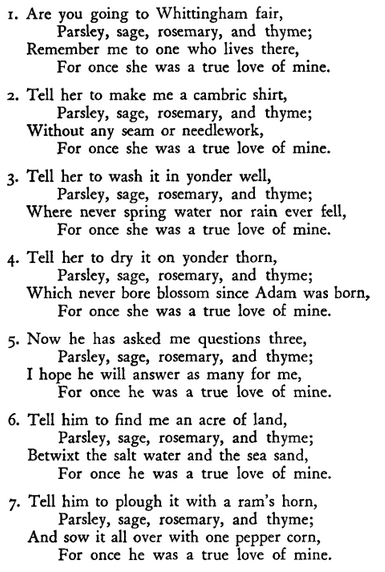
Scarborough Fair
From the first time I heard Art Garfunkel's angelic voice singing the opening lines Scarborough Fair/Canticle, my take on the old English ballad was a mistaken one. I thought the term "Scarborough Fair" was a poetic expression of "fair Scarborough," not knowing it referred to an actual annual trading fair that took place in North Yorkshire town of Scarborough up until the 19th century (with some breaks).
Oddly enough, Bob Dylan, who based his song "Girl from the North Country", which predated Simon and Garfunkel's song by several years, on the same artist's (Martin Carthy) rendition of that ballad, used precisely that poetic expression with his lyrics, "if you're travelin' in the north country fair."
That said, it should be noted that the English ballad was somewhat fluid and one might find Scarborough, Scarboro or Whittingham Fairs.
All these songs are rather peculiar as they require a lover to perform impossible tasks... the tasks may change with each version, but the idea remains constant. Dylan's song bypassed the impossible tasks portion completely, morphing the song into something else entirely. Paul Simon added the anti-war counterpoint lyrics also morphing the ballad into something else while retaining its medieval feel.
Here is Simon and Garfunkel performing "Scarborough Fair" without the anti-war counterpoint:
Martin Carthy, who recorded his song on his 1965 album, "Martin Carthy" may have got his cue from the 1957 album "Matching Songs of the British Isles and America" by Ewan MacColl and Peggy Seeger (whom he later married) or from "The English and Scottish Popular Ballads (The Child Ballads) Volume IV" recorded by Ewan Macoll and A.L. Lloyd in 1956:
"The Traditional Tunes of the Child Ballads, Volume 1" by Bertrand Harris Bronson shows some samples from Child's Ballads and other sources:



"Whittingham Fair" from "The Monthly Chronicle of North-country Lore and Legend," 1889
These lyrics are those given in "The Traditional Tunes of the Child Ballads"
as are these:
I've come across several places that tout the symbolic and/or medicinal significance of "parsely, sage, rosemary and thyme." Personally, while I find them interesting, I also find them pretentious in this application. These herbs are indeed found in recipe and medical books from the 17th and 18th centuries, often in precisely that order. Balladeers and troubadours weren't scholars, chefs or doctors; they were performers. It seems more likely to me those herbs were used in that sequence simply because they were found that way and had a rhythmic sound to them that fit nicely into the verses.
"The Gardeners Kalendar," 1766

The "impossible tasks" were a feature of the Scottish "Elfin Knight" ballads and the Scarborough Fair ballads probably borrowed from them as can be seen in the verses I've culled from an example of the lyrics:
1.THE Elfin Knight stands on yon hill,
Blaw, blaw, blaw winds, blaw
Blawing his horn loud and shrill.
And the wind has blawin my plaid awa
3 'Ye maun make me a fine Holland sark,
Blaw, blaw, blaw winds, blaw
Without ony stitching or needle wark.
And the wind has blawin my plaid awa
6 'My father he askd me an acre o land,
Blaw, blaw, blaw winds, blaw
Between the saut sea and the strand.
And the wind has blawin my plaid awa
Here are Ewan MacColl and his wife Peggy Seeger singing a version of "The Elfin Knight"
Many 19th century references mention "The Elfin Knight" when presenting "Scarborough Fair," as this page from "Traditional Tunes: A Collection of Ballad Airs" by Frank Kidson, 1891 shows:


...Just remember me to one who lives there.
